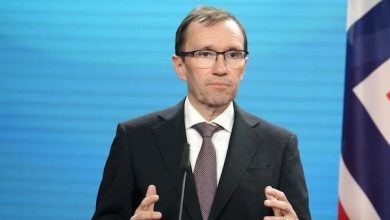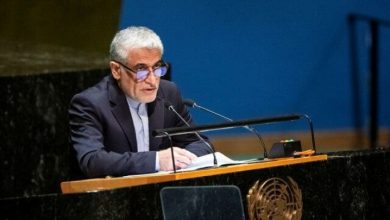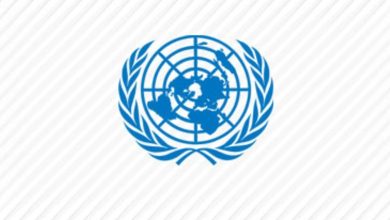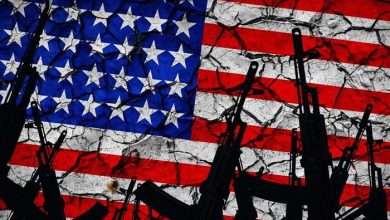Association for the Defending of Victims of Terrorism – Side-Event of the Association for the Defending Victims of Terrorism entitled “Right to the Truth” was held in cooperation with Sentinel Institute (Ireland), Word for Peace (India), the Hague Center for International Law and Investment as a webinar during the 45th session of the UN Human Rights Council attended by of university professors, figures, human rights activists and victims of terrorism.
In the absence of truth, a fair trial cannot be imagined
At the beginning of the meeting, Dr. Mohammad Amin Koosha, who is a lawyer, said that the debate on the concept of the right to the truth as one of the fundamental human rights today can be used to fight terrorism and support victims of terrorism. The benefit of this argument is concluded from the fact that the prosecution of the perpetrators of terrorist acts can make the right to the truth relevant or facilitate the realization of such a right. There are many questions about the existence of such a right, but what is said here is how and why of this connection.
He continued, in answer to the above question, two points are important; first, is there a fundamental right to the truth? Second, if such a right is proved, can trial and prosecution make the right the truth relevant?
Mr. Koosha continued his speech by saying that the right to the truth can be examined from two perspectives, firstly, as a moral value. Truth as a social norm in all political systems regardless of their thinking and ideology has always been affirmed and emphasized by governments and the political systems that govern them. Second is truth as a legal value. From this point of view, the observance of fairness and justice in the trial depends on the existence of the truth, because in the absence of the truth, a fair trial cannot be imagined. In other words, the right to the truth is the right to know the facts of a terrorist act. He continued, “On the other hand, there is no comprehensive definition of the right to the truth, but what is clear is that the right to the truth is a right whose realization causes the victims to be informed about the how human rights are violated.” In the end, he said, it is obvious that terrorist incidents are clear examples of gross human rights violations that not only the victims but also the public opinion should be aware of what really happened.
We live in a time of disinformation
Then, Tara O’Grady, the Irish Human Rights Defender said, “I feel privileged to have been invited to participate by the organizers who are working so hard to raise awareness for those victims and survivors who have been affected by terrorist attacks in Iran. We live in a time of disinformation. A time of propagation of untruth on a mass scale. How can victims expect justice and reparation in this age of technological tyranny.
She continued “as a historian I am keenly aware that history is written by the victors. It has been tweaked, adapted and colorised to suit the will of those who won wars. So we must explore, investigate and dig for Truth, thoroughly documenting and contextualizing events so that we may preserve the facts of key importance. It appears primarily that elites will act on addressing concerns only when exposed to the scrutiny of the public eye and as a result of significant public pressure. This is where NGOs come in to assist with building a strategy for lobbying government.”
Tara O’Grady also stated that Truth commissions are non-judicial inquiries established to determine the facts, root causes, and societal consequences of past human rights violations. Through their focus on the testimony of victims of atrocity, truth commissions provide acknowledgement and recognition of suffering and survival to those most affected.
She went on to address cases of failure of judicial processes to discover the truth. Ms. Tara O’Grady said the overarching monster of impunity was most recently illustrated yesterday by the decision by the Public Prosecution Service in Britain not to prosecute the soldiers who fired at and killed civil rights demonstrators on Bloody Sunday. In situations such as these it falls to civil society to mobilise and collaborate on ways to provide meaningful support in the community, through counseling, through care and contact, through social events, commemorations and advocacy.
At the end, she said “This I believe is beyond the bureaucratic capacity or financial interest of state actors, and in real terms the burden to manage to achieve programs of this nature rests on the shoulders of the families and communities themselves. Our duty is to assist them, to listen with attention and respect, to encourage and equip them to create vivid memorials, through documentation, art, film and transnational partnerships which positively influence society to reject terrorism in all its forms and to preserve the truth for future generations.”
The right to the truth has two aspects, individual and collective.
Anicee Van Engeland, a British university professor at the beginning of her speech said “The first issue is, ‘what is the meaning of the truth contained in the law?’ Some laws speak of the right to the truth, and in others the right to receive information about the case is discussed, and therefore, there is no precise definition of what the truth is. Another thing is that the way we deal with truth is very Western, that is, it is based on facts and practices. She continued, but in fact-finding committees, victims are asked to tell their personal stories so that the truth can be discovered through dialogue. In this way, the definition of truth is different. So the first issue is the meaning of truth. The next issue is the emergence of the concept of the right to the truth. This concept began with the establishment of courts in Africa and Ireland in forms of restorative justice.
In another part of her speech, Professor of international security at Cranfield University said “The courts can implement justice, but there are cases where the courts have failed to understand what is happening”. For example, one must ask how many people must be killed in order for the crime of genocide to take place. For this reason, the idea comes to mind that it is better to emphasize mechanisms outside the judicial process. She continued, the right to the truth has two aspects, individual and collective. Individually, victims become aware of the aspects of events, but accepting the right to the truth or the right to awareness causes society to overcome its bitter social memories. In this way, all members of a society have the right to the truth, and it is not only the victims or the families of the victims who have the right to the truth.
Finally, Mr. Van Engeland said, “We need to know that the courts are not transparent and that some individuals can influence the court process and manipulate the truth, and there is political manipulation of the courts”. She continued, “Finally, I must say that we also have the right to the truth.”
There is a shocking discrimination between ISIL victims in Paris and ISIL victims in Baghdad
Jan Fermon, an international lawyer, was the next speaker. At the beginning of his speech, he said, first of all, let me say which truth is the truth and how we can enforce right to the truth. I think there should be firm laws on the right to the truth. But if the definition of truth is not clear, and if it seems difficult to define and reinforce the right to the truth, the question may arise whether the right to the truth is adequate. He continued that the truth from the judicial point of view is not necessarily the truth from the victim’s point of view. Can the judiciary provide the victims with the truth they want? Sometimes this truth is only part of the truth.
Then, Jan Fermon said, “I personally prefer to refer to the commitments that governments have made to investigate and prosecute crimes committed.” If we pay attention to these laws, this is the aspect that we can strengthen the request of governments for the right to the truth. Conventions such as the Genocide Convention, the Geneva Conventions, and the Convention on Torture are among the international laws that impose obligation on countries that victims can call upon and urge governments to use political and judicial mechanisms for investigation.
“Another issue I want to address is that I have been involved in discussions about the crimes committed by ISIS in recent years,” the Belgian lawyer said in another part of his speech. They have committed crimes against humanity and genocide. What I have seen and realized is that the use of anti-terrorism laws that European countries have implemented on ISIL, instead of holding ISIS members accountable and providing at least one judicially truth to the victims of ISIS crimes, is contradictory and has blocked the right to the truth.
“I met with a number of Yazidi women in northern Iraq, Syria and in Geneva,” he said. I attended a meeting with some Yazidi women. One of them said she had been taken hostage and repeatedly raped by ISIS members. She said the rapist was a German. She knew which country the ISIS member was from. She even knew his name among the members of ISIS and was aware of his disability. I think with this information, the German prosecutor can investigate who this person is. The Yazidi woman said she was involved in a rehabilitation project in Germany and no one asked her about it because no one was going to investigate on this crime of the ISIS member.
In another part of his remarks, Jan Fermon said, “At least in the case of ISIS, if we want to give the victims of this terrorist group the right to the truth, it is essential that we go beyond these anti-terrorism laws in Europe and have a real responsibility and investigation to provide the victims with the right to the truth.”
The Belgian lawyer continued to say that European anti-terrorism laws discriminate between European victims of the ISIS terrorist group and victims of Middle Eastern countries such as Syria and Iraq. Judicial authorities should investigate who organized these crimes, who gave them the weapons, who financed them and then investigate on the terrorist attacks in Paris and other parts of Europe.
He concluded that the victims of the terrorist attack on Charlie Hebdo had access to some information that had been clarified through a serious investigation. The victims of Iraq and Syria have no access to anything because no one is interested in investigating the crimes committed against them. I think there is a shocking discrimination between the victims of ISIS in Paris and the victims of ISIS in Baghdad. This is a shocking situation.
At the peak of happiness, wickedness of the Hypocrites (MEK) changed my life
Ms. Golrokh Mehri, survivor of terrorism explained about the terrorist attack in which her husband was killed and she was injured. She said “Dariush and I were both very happy with our job promotion and buying a car. We went to the streets for sightseeing and celebrating. On the way, I bought a red balloon for Ramtin, one and a half year-old son and he lost it when the wind blew. My son was really upset. Maybe he knew what was going to happen. We entered the gas station for fueling. Suddenly, there was an explosion, I felt like I was in an empty place. At first I could not hear any sound. Unconsciously, I was holding my baby in my arms, but I could not do anything for him. The projectiles of the explosion injured my whole body and one of them hit my dear husband on the head and he was bloody. It was a horrible scene. I could not get up and I could not feel my feet. I was in a moment between this world and the other world and I asked Lord to keep my son safe in this incident.
She continued “On 27 November 1981, at the peak of happiness, wickedness of the Hypocrites (MEK) changed my life and left me alone on a wheelchair, with the grief of my husband and with a world of dreams. It takes hours to talk about the sufferings I had so far. But, what can I do that telling a small part of these facts can be effective in justifying public opinion and preventing the recurrence of such catastrophes. So, suffice it to say that I really tolerate an endless grief, most importantly; the truth has not been clarified after 39 years. Why and who planned and directed this attack and where are they today? I hope that the authorities, wherever they are, will hear our voice and take a measure to answer these questions.”
I hope the terrorists will see the result of their actions
Ms. Zohreh Haghpanahi, survivor of a terrorist attack and and wife of Martyr Tavassoli, another speaker at the meeting, stated that September 30 is the anniversary of the martyrdom of my husband, Martyr Mohammad Tavassoli, and my own injury in the 1982 in the terrorist attack in Imam Khomeini Square in Tehran. My husband was a mechanical engineering graduate from the United States and had just returned to Iran and was burned and martyred in this attack. But today, 38 years after this tragedy, we still do not know the truth about the planners and perpetrators of this crime.
She continued, “Given that this meeting is about searching for the truth by individuals, we want the facts behind such terrorist attacks to be clarified.” Why do the perpetrators of these explosions live in peace in other countries while they have deprived us of peace? At the end of her speech, Ms. Haghpanahi said, “We hope that our message will be spread as we are victims who have tasted the bitter taste of terrorism and that other countries and nations will know about the sufferings we have had.” And we expect that the terrorists will see the result of their actions.
At the end of the meeting, Mr. Mohammad Ali Pakenjad, the son of martyr Dr. Seyed Reza Pakenjad, who was assassinated, read a statement by the Association for the Defending Victims of Terrorism entitled “Right to the Truth.”





